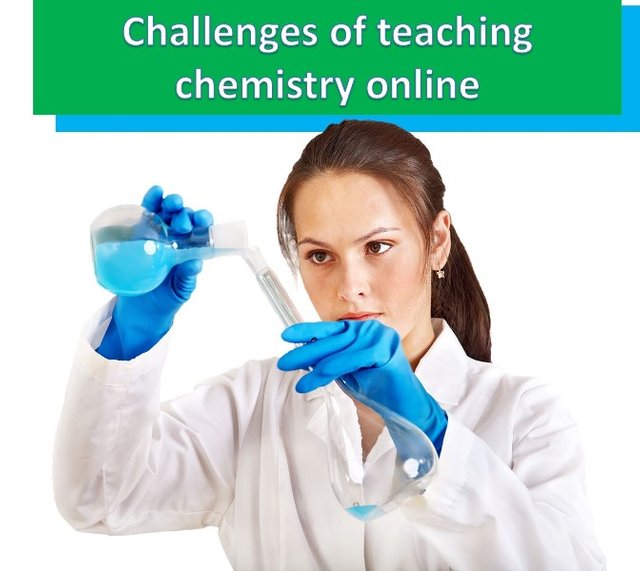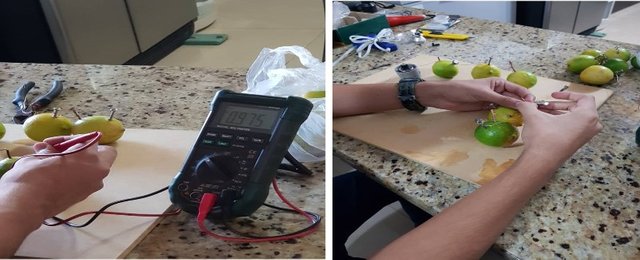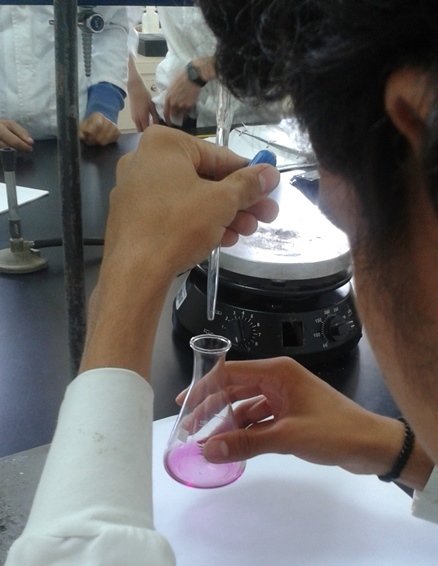Challenges of teaching chemistry online
As everyone knows, because of this pandemic, education at almost all levels was forced to move to the virtual environment. But while there are areas of knowledge that can adapt very well to this mode of study, what about chemistry classes and other experimental sciences? How to make a student acquire online the skills that should be acquired in a laboratory handling instruments and substances?

With virtual education, the chemistry student misses out on the experience of working in a real laboratory. Source: Edited image, original from Pixabay.com.
Certainly, the pandemic caused by COVID-19 has created important challenges for education, it is enough to name the challenge that represents for many to adapt to this educational modality, since in many countries the access to Internet is very deficient and in some remote regions it is almost null.
And apart from this fact, for many areas of education, this pandemic has presented particular challenges that are very important and difficult to solve. Among the areas most affected are those that require practical classes for students to verify certain phenomena or because they need to acquire skills in the use of techniques and instruments, as is the case in chemistry classes.
Therefore, as we have moved learning to the virtual environment, adapting chemistry laboratory classes has been one of the most difficult challenges in this process.
How to teach chemistry online?
The theoretical content of this area of knowledge is not difficult to adapt to the online modality, although it has its challenges, perhaps the first challenge was for professors to adapt their traditional classes to the virtual environment, for which we had to familiarize ourselves with the available tools, such as conference platforms, like Zoom. In my university the virtual modality already existed for some programs, so we were able to take advantage of some platforms, such as Moodle, to create virtual learning environments.
Once we overcame the implementation of the tools it was not difficult to start teaching our virtual classes, perhaps the most difficult part of this situation was to set aside the part of teacher-student and student-student socialization, since many students do not feel comfortable expressing their doubts in a videoconference and they lost their study groups, where among classmates it is easier to study.
And how to adapt the online laboratory?
Now, to face the challenges of teaching laboratory classes online, at the beginning of the pandemic it was proposed to teach only the theoretical content through the virtual modality, and then a special presential course would be taught for the laboratory content.
But since the conditions were not right to return to the classroom, other strategies had to be found. At that time I resorted to photographs and videos of experiments that I had recorded, and then made a presentation to the students with all the necessary data so that they could make calculations and present a laboratory report.
I also resorted to devising simple experiments with substances and materials that students could find at home to exemplify some concepts, such as preparing pH indicators with the sum of purple cabbage and building batteries that would light an LED using lemons and two different metals.

Home demonstration of the operation of an electrochemical cell using lemons. Source: @emiliomoron.
But the pandemic continues, as does the non-return to the classroom. For this reason, work is progressing at my university to set up virtual laboratories to complement the learning of chemistry and other sciences, through simulated or video-recorded experiences, and available on a platform from where the student can access the content at any time, visualize the procedure and collect the necessary data to prepare a report.
But despite these efforts, I keep asking myself, what about the technical skills that a student should acquire? My physicochemistry course is located two semesters away from the end of the chemical engineering career, which means that the students who will graduate this year did not participate last year in laboratory sessions or did their virtual practices, that is, they did not manipulate substances themselves, they did not prepare reagents or solutions, they did not calibrate equipment or make measurements in them, they only saw how to do it.

Students performing an titration in the laboratory. Source: @emiliomoron.
Although virtual laboratories stand out for their visual impact and animation features that allow simulating certain experimental conditions and obtaining data, which allows the student to assimilate theoretical concepts, it is still a digital tool, where the student does not manipulate the instruments or laboratory equipment, which is a disadvantage when it comes to developing procedural skills.
It is evident that areas of study such as chemistry, as well as those requiring laboratories, have been among the most affected by the pandemic. So, as long as we cannot return to face-to-face learning, we will have to continue to exploit creativity and keep looking for solutions that allow us to make the best progress in these areas of education, to continue learning virtually.
Thanks for coming by to read friends, I hope you liked the information. See you next time.

Greetings my dear friend @emiliomoron, glad to see you well.
Brother it must be quite a feat to teach chemistry classes virtually, as you mention it is not the same to see, to do, to learn by doing, despite this I have seen the creativity you have had to teach your classes which requires a great effort, on the other hand, I applaud the initiative of your university for the creation of a virtual laboratory, all channels must be exhausted to provide students with meaningful learning.
See you later, have a great start of the week.
Greetings dear friend. That's right, the practice part has been a challenge, it is certainly not the same to see than to do, but we have tried to advance in the best way that the tools have allowed us. Thanks for your comment, a hug friend, happy beginning of the week to you too.
Hello @emilomoron
So virtual labs, I hadn't heard. If I confess to you, it's been a long time since I've taught classes or anything like that, and I hadn't thought about this complication. Now that you mention it, it is a reality, explaining those areas must be quite complicated, especially since lab practices are very important for that.
Hello my friend. Really the practical part of this area has been a challenge, and the laboratory experiences are very important for the chemistry student, the skills acquired in this way are difficult to provide through a digital medium, so yes, it has been somewhat complicated.
This is an excellent proposal. As a good educator you are looking for ways to maintain good standards of cognitive quality, but unfortunately sometimes it is very difficult for other teachers. Thank you for this article.
Thanks to you for stopping by to read, my friend. We certainly try to maintain a good level in spite of the circumstances, but sometimes they overcome us and present these challenges.
There are few subjects I believe can't be reached online and I believe one of them is chemistry majorly because of the practical side
Greetings friend. That's right, experimental sciences are difficult to attend virtually, especially because of the practical experiences that the student must perform.
The changes that have been generated in the educational process, especially in science learning, are significant and have required the teacher to create new strategies and possible scenarios for learning, especially in the hard sciences such as chemistry. Congratulations very good reflection of the necessary change in the area of chemistry teaching.
Hi @emimoron. That's right, this pandemic is forcing us to be very creative to meet the needs of the student in these areas of knowledge leading us to make profound changes in the way we teach experimental sciences. Greetings and thanks for stopping by to read.
Hello @emiliomoron, I am also a university professor here in the East and I face the same challenge, to teach practical subject classes online and I am concerned about the fact that many phenomena that can be explained "online" also somehow need face-to-face interaction with students, in my In this case, I work with design and construction in the area of civil engineering, and it is very difficult for me to gauge whether the ideas and fundamentals dictated in class are really being established as knowledge in my students.
Very good post to reflect for a while.